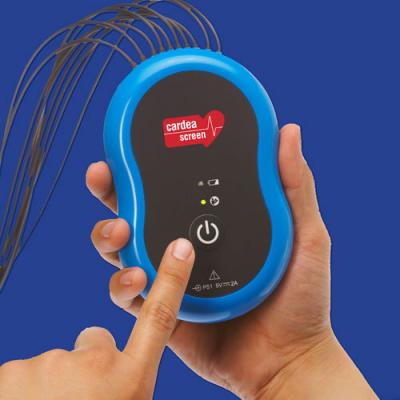
February 27, 2013 — Cardea Associates announced the launch of its new electrocardiographic (ECG) device, CardeaScreen. Specifically in-tune with normal conditions for the athletic heart, CardeaScreen is designed for use during pre-participation exams (PPE) for sports participants age 14 and older. This U.S. Food and Drug Administration (FDA)-cleared device helps physicians identify abnormal cardiac conditions that could lead to sudden cardiac arrest — at a much lower cost than other ECG systems currently on the market.
Sudden cardiac arrest is the leading medical cause of death in sports participants — and often is the first symptom of a cardiac condition — but many high schools, colleges and sports teams can not afford an ECG device. Typically, they sell for $3,000 to $10,000; CardeaScreen is priced well below that.
The handheld device wirelessly connects via Bluetooth to analysis software which runs on a standard user supplied Windows-based PC. The software allows physicians to input responses to specific PPE questions developed by the American Heart Association, as well as enter patient demographic information, previous symptoms of cardiac disease and Echocardiographic data when available. And because it is designed with the athlete in mind, CardeaScreen has a significantly lower rate of false positive results — false positives are a problem because they suggest that there is an abnormal heart condition when there is not. Such results are important to minimize since they could result in excluding an athlete from playing and lead to expensive medical evaluations.
“False positive results can have costly and devastating effects on an athlete and their family," says David Hadley, Ph.D., co-founder of Cardea Associates. "We developed CardeaScreen to make heart screening more accurate, accessible and affordable, with the ultimate goal of identifying cardiac conditions early on to help save lives.”
CardeaScreen produces accurate, comprehensive results using quality data; the ECG transmitter digitizes at 1000 Hz and a resolution of 1 ?Volt. The real-time recording screen continuously displays all ECG trace data that will be analyzed, helping the clinician correct patient motion and other noise that can degrade ECG quality. The single click of a button stops the recording and automatically analyzes the ECG, providing diagnostic recommendations for review by the physician.
The device implements recent diagnostic criteria developed in association with doctors at Stanford University, the University of Washington and other leading heart experts.
"Research, clinical trials, and published results are the foundation of the work we do," says Victor Froelicher, M.D., Cardea Associates co-founder, professor of medicine at Stanford University and cardiologist to Stanford University athletes. "In addition to bringing CardeaScreen to market, we continue to support further research into sudden cardiac arrest. We want to understand the root causes that lead to sudden death so that we can help physicians prevent it."
For more information: www.cardeascreen.com


 January 15, 2026
January 15, 2026 









